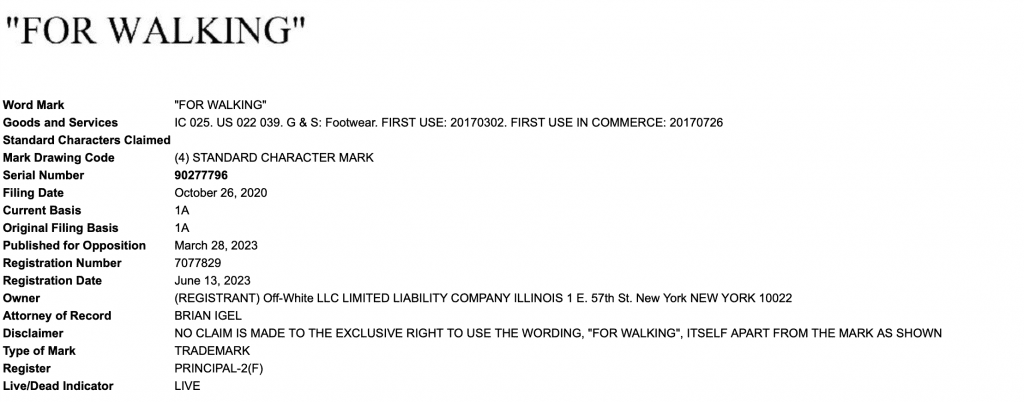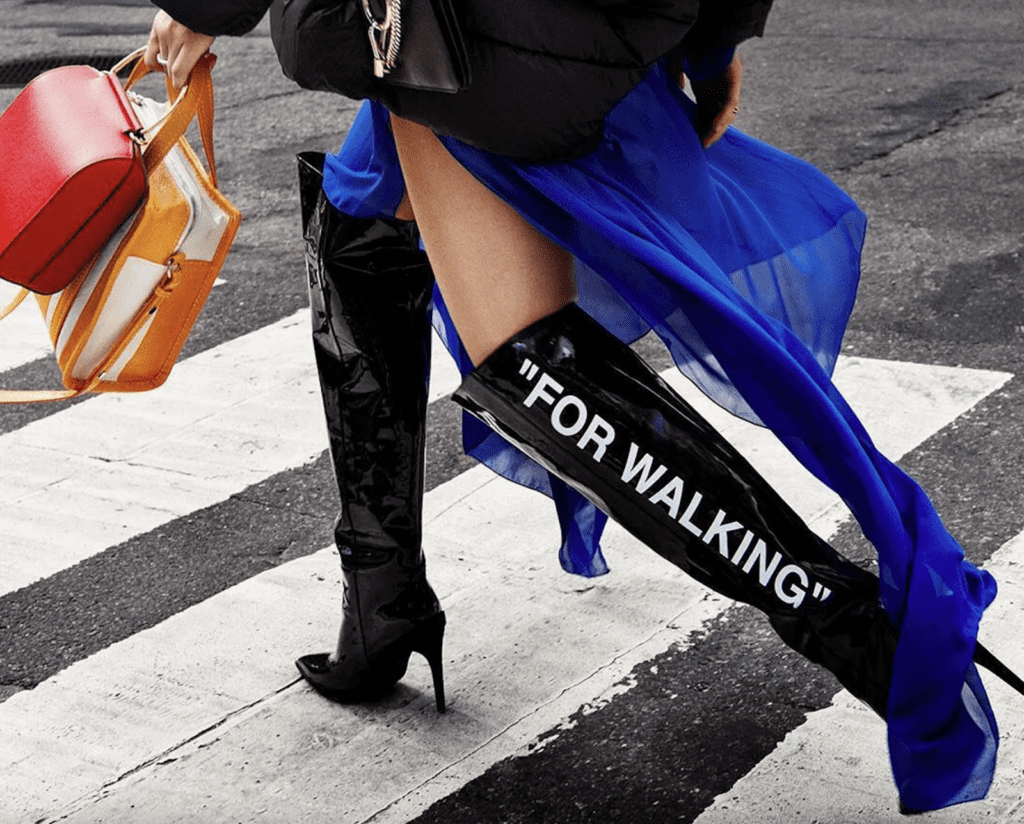Off-White has an interesting new trademark registration in its arsenal. On Tuesday, the U.S. Patent and Trademark Office (“USPTO”) issued a registration to Off-White for “FOR WALKING” … for use on footwear, in what follows from a long-running back-and-forth between counsel for the late Virgil Abloh’s brand and the USPTO. Since Off-White first filed its application back in October 2020, as first reported by TFL, the trademark office fired off Office action after Office action taking issue with the ability of “FOR WALKING” to indicate a single source of goods when used on footwear.
USPTO examiner Shaunia Carlyle argued – on more than one occasion – that the “FOR WALKING” trademark “merely describes a feature and purpose of [the Off-White] goods” and thus, does not serve as an indicator of source. In a subsequent Office Action, she asserted, among other things, that the mark is likely to be viewed by consumers as “merely convey[ing] information about [Off-White’s goods] or similar goods and/or services.”
Counsel for Off-White pushed back, arguing that the inclusion of its signature quotation marks – which can be found across a range of goods in the LVMH-owned brand‘s lineup of products – is significant. The “unique commercial impression created by [its] distinct use of quotation marks” makes it so that the trademark is different from the “mere use of the … phrase [FOR WALKING] without the quotation marks,” the company argued. And courts “explicitly acknowledge that punctuation, including quotation marks, can change the commercial impression of a mark,” Off-White asserted in one of its responses, arguing that “the use of written quotation marks is a widely understood and recognized grammatical device for indicating irony and sarcasm.”

Initially unpersuaded, Carlyle stated that simply “adding punctuation marks to a descriptive term” – in this case, the use of the words FOR WALKING on footwear – “will not ordinarily change the term into a non-descriptive one.” However, fast forward to December 2022, and she stated in an yet another Office action that “while the wording, FOR WALKING, is informational and describes a purpose and characteristic of the mark, [Off-White] may provide evidence that [its use of] quotation marks has acquired distinctiveness.”
Off-White ultimately made it past the final hurdle by: (1) arguing that its trademark has, in fact, acquired distinctiveness, “as evidenced by [its] substantially exclusive and continuous use of the mark in commerce since at least as early as July 26, 2017, as well as the fame of the applied-for mark;” and (2) agreeing to disclaim the FOR WALKING language apart from the mark as a whole (and admitting that the specified portion of the mark is not registrable or enforceable on its own). The disclaimer reads: “No claim is made to the exclusive right to use the wording, FOR WALKING, itself, apart from the mark as shown.”
Making Sense of the Mark
“Since FOR WALKING is disclaimed apart from the mark as a whole, and the registration is based on Section 2(f)” – acquired distinctiveness, “the only element that is left to carry the distinctiveness of the mark would be the quotation marks,” trademark attorney and former USPTO examiner Ed Timberlake told TFL. In other words, Carlyle did not change her tune about the fact that “adding punctuation marks to a descriptive term will not ordinarily change the term into a non-descriptive one.” Instead, she seems to have been swayed by the power of Off-White’s use of quotations to acquire distinctiveness, and thereby, change the commercial impression of the still-merely-descriptive FOR WALKING portion in order to enable the mark as a whole to indicate a single source.
In requiring Off-White to include a disclaimer, Carlyle appeared to adopt the view that “FOR WALKING” is a not unitary mark (i.e., a mark where the individual elements “are so merged together that they cannot be viewed as separable elements,” as the TTAB put it in In re EBS Data Processing, Inc.) – although, she does not outright say so. Off-White seemed as though it may have been angling to get the examiner to treat “FOR WALKING” as a unitary mark in arguing that its use of quotes transformed FOR WALKING into a double entendre. (As Alexandra Roberts states in her paper, A Poetics of Trademark Law, that “a ‘double entendre’ … is one of the most commonly used poetic devices in trademark law and perhaps the one most likely to affect outcomes,” noting that “where factfinders see wordplay in a mark, they often conclude that the mark is suggestive rather than merely descriptive; it can also lead the USPTO to characterize the mark as unitary.”)
A determination by the USPTO that a mark is a double entendre – and thus, a unitary mark – would enable the application-filing-party to avoid breaking up the mark by disclaiming the merely descriptive portion and thus, to amass greater rights in it. That did not happen here, of course, with Carlyle stating in an Office action in August 2021, that she was of “the position … that the proposed mark does not create a double entendre” and that Off-White “must disclaim the wording ‘FOR WALKING’ because it is merely descriptive of an ingredient, quality, characteristic, function, feature, purpose, or use of applicant’s goods and/or services.”
What the registration means more broadly: The facts at hand may be somewhat nuanced, but it is, nonetheless, “a good reminder that trademarks (and trademark registrations) do not hinge on what something is (for instance, the text of phrases, or the punctuation), but on what it does,” Timberlake says. “In the same way that adding air quotes to a spoken word or phrase can convey a more complicated meaning than the spoken word or phrase, alone, here the Trademark Office seems to be saying the addition of quotations marks to words that would otherwise be merely descriptive of the identified goods can carry additional, source-indicating meaning in this context.” This if, of course, what counsel for Off-White argued from the outset.
Note: The USPTO issued a notice of allowance back in December 2020 for Off-White’s other quotation-centric mark, “PRODUCT BAG” – for use on “tops as clothing; bottoms as clothing,” after issuing more than one non-final refusal. To date, Off-White has not filed a statement of use.
As for whether/how Off-White intends to enforce its newly-registered “FOR WALKING” mark, stay tuned for that.














